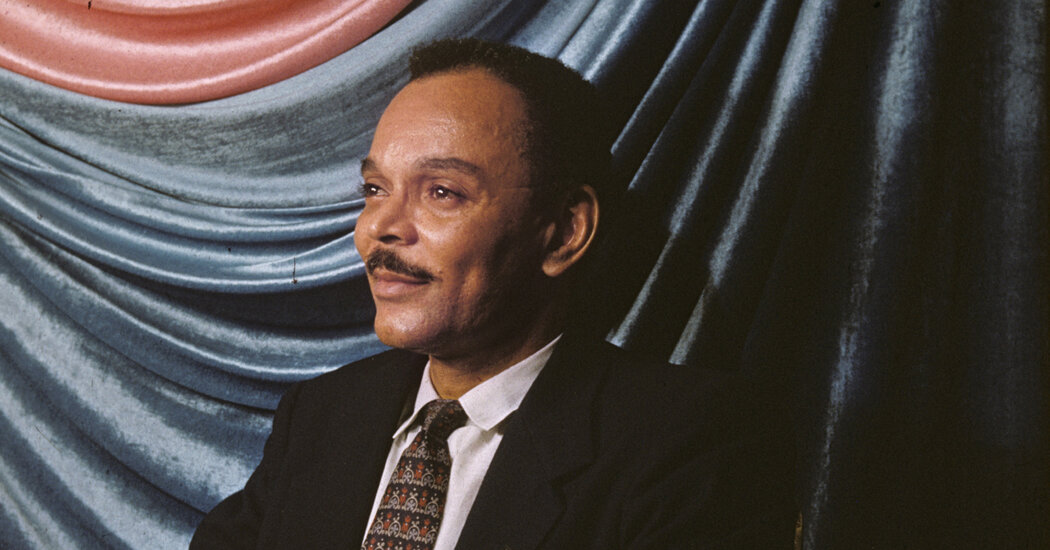When I was 12 years old, my uncle gave me a copy of “The Real Cool Killers,” by Chester Himes. For a nerdy kid who cut his crime fiction teeth on Chandler, Hammett and both Macdonalds (Ross and John D.), seeing this book written by a Black man about Black people — Black cops and con men, Black madams and Black ministers — this unapologetic zenith of Black identity was a revelation in every sense of the word. It felt both spiritual and inspirational. In short, it changed my life. Even though I was a poor boy from rural Virginia who had never stepped foot in Harlem, Himes spoke to me with the kind of wild and powerful clarion call that can only be heard when an elder speaks.
If Chandler is considered the poet of crime fiction and Hammett its great journalist, then Himes is the songwriter of the downtrodden. His stories sing with a fire and light that comes from a simmering sense of loss. A loss of respect, of humanity, of honor.
Grave Digger Jones and Coffin Ed Johnson are not private eyes. They are police detectives and carry with them all the psychological and sociological caveats that come with that occupation in the Black community. And yet Himes is able to garner sympathy and adulation for these two men who, within the world of Himes’s Harlem, try their best to mete out justice equally under an inherently unjust system. They use abhorrent techniques to get information from abhorrent people. They never make the mistake of thinking they are the good guys. To quote another fictional policeman, Rust Cohle, they are “the bad men that keep other bad men from the door.”
But Coffin Ed and Grave Digger don’t have the luxury of white privilege to assuage their conscience. There is no system in place that assures them the ends justify the means. They are self-aware in a way that few characters in a crime novel were in the Golden Age of literary noir. They realized they were not heroes. They were the protagonists; they were among the first antiheroes in crime fiction. But unlike Mike Hammer, they never lied to themselves about who or what they were.
I had never encountered anything like the world or the words of Chester Himes. But I knew I wanted more. The next book I devoured was “Blind Man With a Pistol,” a deeply twisted and morally ambiguous novel about the senseless nature of violence. A work that is both terrifying and philosophical, it was a watershed moment for this young wannabe writer that also just happens to have one of the most fearless endings in crime fiction history.
As I read more of Himes’s work, I came to understand he wasn’t just a great Black crime fiction novelist. He was a great novelist. On par not only with his contemporaries in the crime fiction world but also with the great novelists of his time regardless of genre. He is a contemporary of Ralph Ellison and Richard Wright, Langston Hughes and William Gardner Smith, Hemingway and Fitzgerald. His implacable drive to examine the Black experience, the disingenuous nature of the American dream, the reality of pain and sorrow and what it does to the soul — that is what makes him the bard of the existential African American psyche.
Himes’s life was a tangible journey through that psyche. The son of educators, Himes had his first, but sadly not his last, experience with the vile nature of racism in America at the age of 13. Because of some misbehavior on his part, his mother kept him from attending school to help his brother in a science demonstration that used gunpowder as an active agent. Tragically, his brother was blinded in that experiment and then was refused treatment at a white hospital. Himes reflected upon that moment later, saying: “White clad doctors and attendants appeared. I remember sitting in the back seat with Joe watching the pantomime being enacted in the car’s bright lights. A white man refusing; my father was pleading. Dejectedly my father turned away; he was crying like a baby. My mother was fumbling in her handbag for a handkerchief; I hoped it was for a pistol.”
Later, after the family had moved north to Ohio, Himes found a wildness in the streets of Cleveland that spoke to something wild within himself. Arrested and incarcerated for eight years for armed robbery, Himes literally wrote himself out of that Tartarus, finding his voice and his implacable drive within the confines of that stone and iron dungeon. Those years he spent behind bars, cut off from the rest of the world, shaped not only his literary point of view but also his worldview.
“It seemed so illogical to punish some poor criminal for doing something that civilization taught him how to do so he could have something that civilization taught him how to want,” he wrote. “It seemed to him as wrong as if they had hung the gun that shot the man.”
Himes’s was a life lived at every level and within every hierarchy of the African American experience. From middle-class stability to painful poverty to disillusioned expatriate, his life was a parallel to the African American experience of the early 20th century, and he used this in his work time and time again.
Himes inspired countless writers, but he was a touchstone for Black writers specifically. His ferocious tenacity in the face of racism and prejudice laid the foundation for the path many of us have walked in the years since he published his first novel. On the family tree of African American crime fiction, there is a direct genealogical link from Coffin Ed Johnson and Grave Digger Jones to Easy Rawlins and John Shaft, to Aaron Gunner, to Blanche White, to Marti MacAlister, to Larry Cole, to Cass Raines and Dayna Anderson. Although Himes wrote in multiple genres and disciplines — including social criticism, with novels like “If He Hollers Let Him Go” and “Lonely Crusade” — he is most well-known for his Harlem cycle, with its mordant and fatalistic recreation of a Harlem that existed but was embellished and made mythic by Himes’s razor-sharp prose.
“The Harlem of my books was never meant to be real,” he said; “I never called it real; I just wanted to take it away from the white man if only in my books.”
That is not to say Himes is a humorless, all-knowing guru. His books brim with hilarity, hard-won intimacy and steely camaraderie. My mother always beamed with the light of memory when she regaled me and my brother with the story of her first date with my father. They’d gone to see the movie “Cotton Comes to Harlem,” based on Himes’s book of the same name. Years later, I would take a date to see another Himes adaptation, “A Rage in Harlem.” That kind of serendipity is a magical thing that seems to happen often when one discusses the work of Chester Himes. It’s Black magic, made with Missouri red clay and Cleveland smokestacks and sprinkled with love, laughter and a smattering of philosophy.
That’s the power of his words. He helped many generations create memories through a shared connection to his work, a sort of sacred tapestry that weaves its way through souls. A broad panoply of feelings, ideas and emotions integral to the Black experience in America filters through the prism of his crime novels.
I often say crime fiction is the gospel of the dispossessed. If that’s true, it’s in the Book of Himes that we find the parables and the sermons that cry out with unbridled, righteous rage at the unfairness of life in general, and the particular type of unfairness Black people continue to experience.
As he says in one of his more famous quotes: “There is an indomitable quality within the human spirit that cannot be destroyed; a face deep within the human personality that is impregnable to all assaults.”
Chester Himes knew this intimately. He lived it. He sat down and articulated it in a way that was neither saccharine nor servile. Just magnificent.
That is his legacy. That is his gift to all of us.

